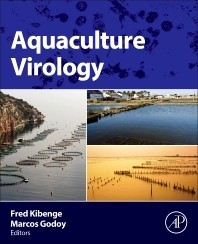
Editors: Frederick S.B. Kibenge, Marcos G Godoy
Preface
The textbook Aquaculture Virology covers theprinciples of clinical virology for viruses of the three major aquatic food animals: fish, crustaceans and mollusks. The increasing importance of these aquatic animals as an excellent source of quality protein for human consumption has resulted in increased interest in aquatic animal viral diseases, which are the principal natural limiting factors for aquaculture worldwide, causing massive losses in farmed and occasionally in wild population Due to the rarity of effective viral vaccines, and in the absence of antiviral drugs for use in aquaculture, prevention and effective control of viral diseases rely very heavily on biosecurity, hygiene and attempted eradication by depopulation. Such
Control measures depend on an understanding of all aspects of the virus and its relationship to the disease and epidemiology including interaction between wild and farmed populations. This is an area that has desperately needed a comprehensive textbook for at least two decades; this book attempts to fill that knowledge gap and become the "go-to" book for this topic.
To date, textbooks on viruses infecting fish, crustaceans and mollusks have been on the whole "disease-centric" and focus on individual viral diseases selected based on “epizoo-centric" approaches, with little to no coverage of the basic biology of the viruses. This is in contrast to textbooks on viruses infecting terrestrial-farmed, pet and free-range (wild)—animals, as well as humans. Where aquatic animal (mostly fish) viruses are included in the various animal virology textbooks, they are consistently relegated to the last pages of the various chapters, in most cases with very limited information. Moreover there is no context for aquaculture being described in a similar way as the terrestrial viruses impacting agriculture or human health. Despite considerable advances in animal virology in recent years, coupled with an economically important global aquaculture industry, knowledge of viruses of animal aquaculture is still sparse and in some cases outdated, although these viruses are closely related to well-known virus families..
The last book in fish virology (Fish viruses and fish viral diseases, 1988, Wolf, K.) was published in the 1980s. A lot of work has been done on fish viruses, and many new aquatic animal viruses continue to be discovered. The editors of Aquaculture Virology wanted to present the current state of knowledge of aquatic animal viruses within the current virus classification and taxonomic context, thereby allowing readers to draw on the principles of general virology.
The authors were encouraged to use the same format in all chapters to facilitate the reading and studying. Thus whereas each chapter includes the main specific diseases that affect the aquatic organism, the description of each disease includes disease name, structure and composition of virus, classification and virus replication, epidemiology, pathology and immunity, diagnostic methods (gross pathology, histopathology, cell culture, polymerase chain reaction, sequencing, enzyme linked immunosorbent assay, etc.) and prevention and control. The information in the book provides the reader with readily applicable and updated knowledge, delivered in a systematic and succinct way. Those interested in aquatic animal viral diseases will find that the book provides comprehensive, high-quality information in a single source, detailing the disease viruses, pathology, laboratory methods for the detection and confirmation of the virus and the prevention and control of these diseases within aquaculture systems. This book targets a unique audience knowledgeable in aquaculture and fisheries with interest in animal pathogens, specifically viruses. This book will be used by researchers, teachers, students, diagnostic laboratory staff, clinical veterinarians, aquaculture disease practitioners, farmers and all people interested in viruses in general.
The authors for the different chapters are invited international experts recognized in their specific virus family or diseases. The editors gratefully acknowledge all the authors for their contributions and keeping to the dealines
Table of contents
General Aspects
1. Introduction to aquaculture and fisheries
2. Classification and identification of aquatic animal viruses
3. Unclassified and unassigned aquatic animal viruses
4. Diagnosis of aquatic animal viral diseases
5. Prevention and control of viral diseases in aquaculture
6. Determinants of emergence of viral diseases in aquaculture
DNA Viruses of Fish
7. Poxviruses of fish
8. Iridoviruses of fish
9. Alloherpesviruses of fish
10. Adenoviruses of fish
11. Papillomaviruses and polyomaviruses in fish
12. Circoviruses of fish
RNA Viruses of Fish
13. Retroviruses of fish
14. Reoviruses of aquatic organisms
15. Birnaviruses of aquatic organisms
16. Totiviruses of fish
17. Paramyxoviruses of fish
18. Rhabdoviruses of fish
19. Orthomyxoviruses of fish
20. Coronaviruses in aquatic organisms
21. Picornaviruses of fish
22. Caliciviruses of fish
23. Togaviruses of fish
24. Hepeviruses of fish
25. Nodaviruses of fish
DNA Viruses of Crustaceans
26. Nimaviruses of crustaceans
27. Nudiviruses of crustaceans
28. parvoviruses of crustaceans
29. Circoviruses of crustaceans
RNA Viruses of Crustaceans
30. Totiviruses of crustaceans
31. Togaviruses of crustaceans
32. Nidoviruses of Fish and crustaceans
33. Dicistrovirvses of crustaceans
34. Nodaviruses of crustaceans
35. Bunyaviruses of crustaceans
DNA Viruses of Mollusks
36. Iridolike viruses of mollusks
37. Malacoherpesviruses of mollusks
38. Papillomalike viruses and polyomalike viruses of mollusks
RNA Viruses of Mollusks
39. Picornalike viruses of mollusks
***for more please visit the library***
Prep. / Ayman Ashry
Manage. / Mona Mahmoud



ساحة النقاش